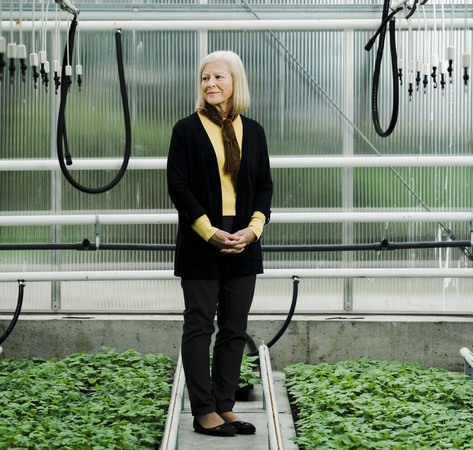A research team that includes Kwantlen Polytechnic University (KPU) experts is looking for solutions to help Canadian producers grow berries sustainably and competitively out of season.
KPU has partnered with Laval University to develop tools and technologies to help future-proof food production in Canada through the Weston Family Foundation's $33-million Homegrown Innovation Challenge.
"The challenge encourages collaboration between academia, industry, and other partners to support food security in Canada by bringing our innovations and ingenuity to build systems. It's a wonderful, altruistic gesture," says Dr. Deborah Henderson, director of the Institute for Sustainable Horticulture at KPU.

Deborah Henderson
The KPU team is one of 15 recipients of a Spark award, which provides $50,000 of seed funding to write a proposal for the competition's next phase. The next phase will award 10 grants of up to $1 million to innovation teams to develop small-scale proof-of-concept plans over 18 months for a growing system capable of reliably, sustainably, and competitively producing berries out of season in Canada. Further funding will be awarded to eligible teams in stages to develop and scale their innovations.
Canada's growing season is brief, and growing indoors requires a lot of energy. But Henderson says growing berries year-round in a northern climate is possible if the highest costs of production – labor and energy – can be reduced.
"Pesticide-free and energy-neutral is the goal. Using alternatives to chemicals will reduce the carbon footprint of greenhouse production and food production in general. There's a large carbon footprint to producing chemical fertilizers and pesticides," says Henderson.
The KPU-Laval proposal will also involve other partners in areas such as energy recovery, lighting, robotics, and integrated pest management.
The Weston Family Foundation challenge is a six-year initiative. Its goal is to find an environmentally sound and financially sustainable berry-growing solution that could be applied to a variety of fruits and vegetables in Canada.
Most of Canada's produce is imported from other countries. The foundation says that creates potential food shortages due to food-systems disruptions such as border closures, droughts, floods, or pandemics.
"There is a golden opportunity to boost innovation in the food sector by nurturing bold, game-changing solutions for agricultural producers," says Emma Adamo, chair of the Weston Family Foundation. "By catalyzing these solutions for berries, we anticipate the creation of systems relevant to a broad array of fruit and vegetable crops, helping to position Canada as a leader in this sector."
First-round proposals in the Homegrown Innovation Challenge are due in December. Projects that advance will begin work in the spring.
For more information:
Kwantlen Polytechnic University
www.kpu.ca
